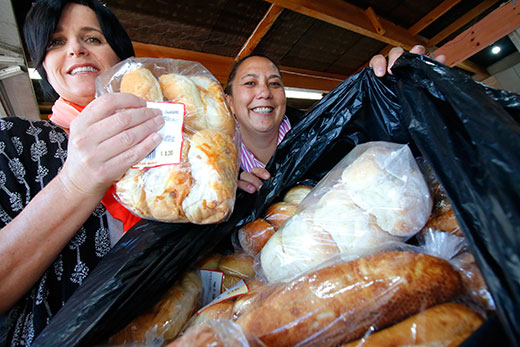A Tauranga pioneer in food recycling believes New Zealand - and Tauranga in particular - is doing plenty when it comes to leftover supermarket food and has ruled out the need for Government legislation.
This week in France, parliament unanimously voted to ban food waste in big supermarkets, effectively outlawing the destruction of unsold food.
Good neighbour Aotearoa food rescue volunteer Tracy Brain and Maori Women's Welfare League's Pene Nepe packaging bread donated by supermarkets. Photo: Bruce Barnard.
It is now illegal for French supermarkets to throw away food, with the option of donating it to charities or for animal feed.
And it's a move that has prompted questions regarding whether New Zealand should follow suit.
Good Neighbour Aotearoa Trust food rescue pioneer Lavina Good believes Kiwi supermarkets are already proactive in passing on food that's safe to eat but not good enough to sell.
The Tauranga-based food rescue charity, formed last February, began collecting such food and currently donates it to 18 charities throughout the Western Bay, including Tauranga Women's Refuge, St Vincent de Paul and Merivale Aroha Centre.
During this time it has saved 33 tonnes of food destined for Tauranga landfills, by teaming up with New World in Brookfield and Gate Pa and Pak n' Save in Tauranga.
'33 tonnes,” says Lavina, 'that's 33 elephants. It's an amazing figure and every time I say it I get a little buzz.
'That was all going to be thrown out and council would have had to disperse that. The greenhouse gasses would have been fizzing.”
Lavina says this shows there is no need for government intervention on an issue people are already aware of and are keen to reduce.
'No one feels comfortable about throwing food away, let alone the supermarkets,” she adds.
'They don't like throwing food out and it's difficult because it's not financially viable for them to take that food to a charity.
'They don't want to throw it away and it doesn't need to be legislated. To be honest there is too much legislation in this country already. I can hardly remember to put my seat belt on.”
Brookfield New World owner Brendon Good says teaming up with the food rescue charity was a perfect match to ensure all unfit for sale food was redistributed to charities as opposed to being dumped.
'From our point of view it's fantastic,” says Brendon. 'It's great seeing the products being used, and less is going into the rubbish so it's less cost as far as rubbish collection goes.”
A Countdown spokesperson says the supermarket chain already has a policy of donating any food that is still fit for consumption to its community charity partners, including The Salvation Army, FairFood, and Food Share through its three-year-old Food Rescue programme.
In the last financial year alone, Countdown donated more than $3.4 million of food and, to its knowledge, is the only food retailer to have this level of national food rescue programme set up in New Zealand.
Nationwide, around 150 Countdown stores partner with The Salvation Army for non-perishable foods. Where there isn't a Salvation Army partnership in place, stores will partner with their local food bank.
'As a food retailer, we are legally obliged to ensure the food we sell is safe and suitable for consumption,” says the spokesperson.
'When donating foods, we are equally obliged to ensure that the recipient organisation can maintain the safety and suitability of that food.
'We also have partnerships with local farmers for food that's not suitable for human consumption, so really as little as possible hits the waste stream.”
Since 2006, Countdown has reduced waste to landfill by 42 per cent despite, having 33 per cent more selling space – via new and upgraded stores – than in 2006. The Food Rescue programme is an integral part of this achievement.
'The social benefit of giving food a second life really can't be underestimated,” they add.
'It's humbling to receive regular feedback from our partners as to the impact Countdown's food donations make on people's lives.”
What do you think? Should NZ follow suit?



1 comment
So much waste
Posted on 28-05-2015 12:04 | By Towball
is being distributed by a vast amount of organisations in addition to the few local listed companies so why not cut back on production reducing waste then potentially reducing cost. Is this approach to logical with all the automated systems in place to moniter sales . Another question being why is there such emphasis on Maori still in this country when we are being portrayed as a multi cultural nation. There are services in place for all foreigners migrating here and support networks but what about us few remaining 6th generation plus NZdrs , there is absolutely nothing. Apart from skin colour I am no different to any Maori but have no extra entitlements . No refuge, education grant,food support, and so on. Guess I am being viewed as racist but wait until all other nationalities jump on board for equal entitlements what then ? .
Leave a Comment
You must be logged in to make a comment.